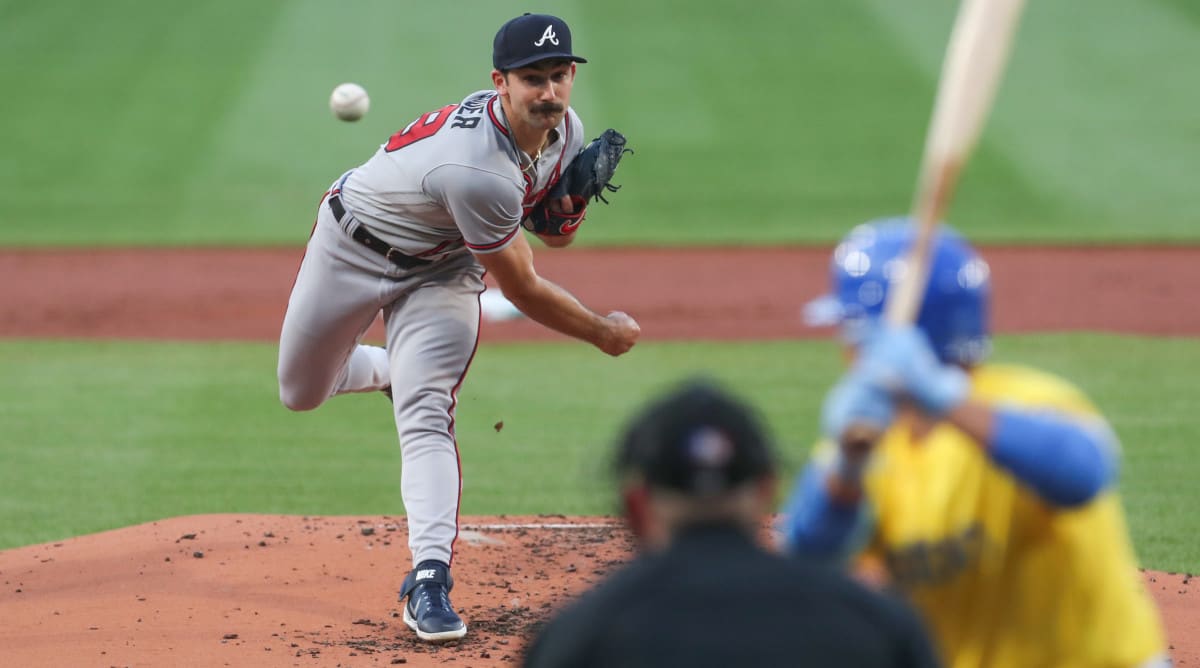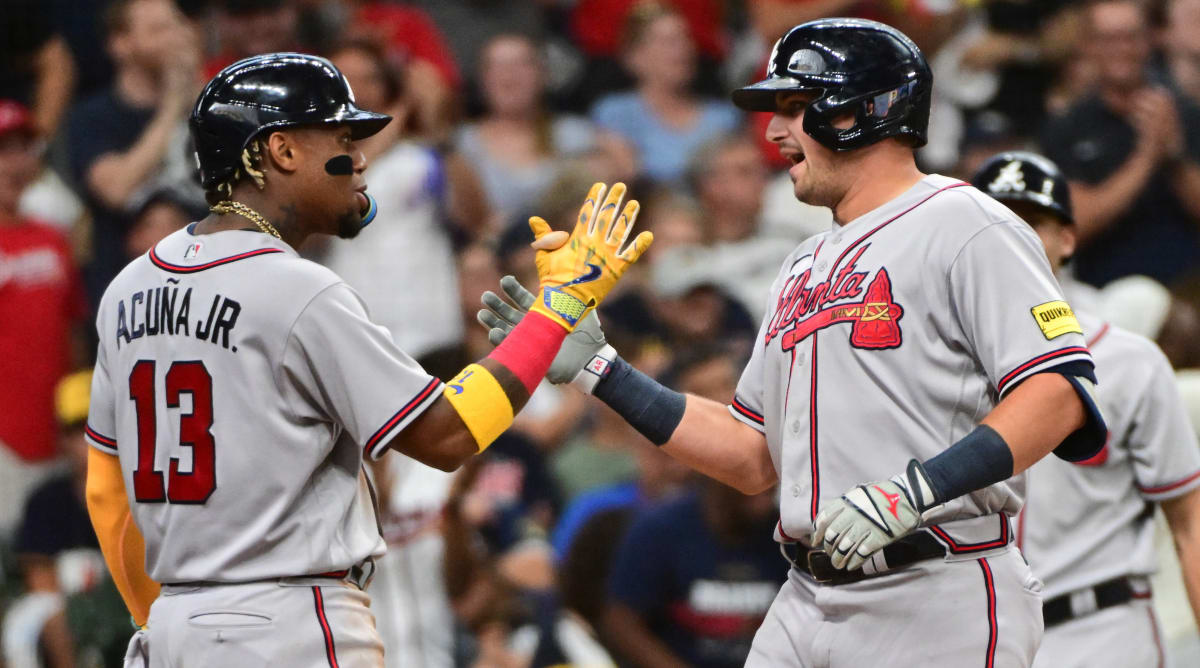The Braves will enter the playoffs with the most wins this year and a rested pitching staff after blowing the doors off the National League East. They’ve had a double-digit lead since mid-August. To Atlanta president of baseball operations Alex Anthopoulos, cruising into the playoffs provides an edge they lacked last year, when the 101-win Braves were one-and-done after a division series against Philadelphia.
“One thing that a good start and a good season allows us is to have a little more emphasis on prioritizing rest in the rotation over the last month,” Anthopoulos says. “Our rotation was out of gas when we got to the playoffs last year. I felt like the playoffs was the Mets series. It was great, but it caught up to us.
“Take nothing away from the Phillies. They were great. They earned it. But we felt like our rotation was gassed when we got to the playoffs.”
Starters Max Fried, Spencer Strider (pitching after 25 days off after a strained oblique) and Charlie Morton gave up 12 runs to the Phillies in only 7 2/3 innings in the NLDS— and that’s after the team had five days off after the final regular season game.

Paul Rutherford/USA TODAY Sports
So, Atlanta is better positioned for October this time, right? Well, no.
Every year around this time, teams, fans and media construct arguments that a “rested” team has an edge going into the playoffs. But just about an equal number from the same groups argue that the “hot” team has the edge because of “momentum” from winning pressure-packed games down the stretch.
Both theories are part of the glory of October myths, such as “small ball wins” in the playoffs. (Of the 40 postseason games last year, only five were one with even one sacrifice bunt.)
Here’s the truth: There is no edge to how teams enter the playoffs (other than, perhaps, a roster as healthy as possible). Rested teams, hot teams, cold teams … all kinds of teams have won in October.
The Braves may think they have an advantage by resting their starters, but they don’t. The postseason is too random, too small of a sample size. One bad day, one hot opposing pitcher, one bad bounce and the heft of your 162-game season means nothing.
Last October proved, again, the randomness of playoff baseball. Of the eight wild card and division series, five were won by the team with the worse record. The distribution of talent among playoff teams—especially as roster use is narrowed—is more even than in past eras. The “better” team is a more fungible concept, especially as teams remake themselves at the trade deadline. The plethora of off days in the playoff schedule also changes the rhythm of teams and player-use patterns.
The Braves, you might argue, are a super-team that rises above these rules of thumb. Not only do they lead the majors in runs and home runs, but also their slugging percentage of .501 is on track to establish them as the greatest slugging team in American or National League history. (The 2019 Astros set the mark at .495.)
But the data show teams like Atlanta that win their division easily, affording plenty of rest entering the playoffs, don’t have a huge edge, if any at all.
Since 1999, 12 teams won their division by 15 games or more. Eight of those 12 super-teams were knocked out in the first round. Three of them won the World Series.
Division Winners by 15+ Games in Postseason, 1999-22
| Year | Team | Division Lead | Postseason W-L | Finish |
|---|---|---|---|---|
2022 |
Dodgers |
+22 |
1-3 |
Lost NLDS |
1999 |
Cleveland |
+21.5 |
2-3 |
Lost ALDS |
2008 |
Angels |
+21 |
1-3 |
Lost ALDS |
2017 |
Astros |
+21 |
11-7 |
Won WS |
2019 |
Dodgers |
+21 |
2-3 |
Lost NLDS |
2017 |
Nationals |
+20 |
2-3 |
Lost NLDS |
2002 |
Braves |
+19 |
2-3 |
Lost NLDS |
2016 |
Cubs |
+17.5 |
11-6 |
Wons WS |
2017 |
Cleveland |
+17 |
2-3 |
Lost ALDS |
2022 |
Astros |
+16 |
11-2 |
Won WS |
2003 |
Giants |
+15.5 |
1-3 |
Lost NLDS |
2011 |
Tigers |
+15 |
5-6 |
Lost ALCS |
2023 |
Braves |
+15 |
TBD |
TBD |
Now that the Braves will enter October with their pitchers rested and lined up, what are the best avenues for a team to take them out?
1. Keep them in the park.
The Braves are 35-35 when they hit one home run or none. When they hit a second home run, they win 77% of the time (61-18). The problem for opponents is the Braves hit homers too often from too many spots in the lineup to count on this as an executable strategy. Let’s move on.
2. Keep Ronald Acuña Jr. off base.
The Braves are 28-24 when Acuña is on base no more than once and 27-26 when he doesn’t score. Again, this is not a likely strategy to count on. It’s like facing Michael Jordan’s Bulls in the playoffs with the goal of keeping him under 20 points. Acuña is just too good to render a non-factor over a series. Keep moving.
3. Attack Braves hitters with high fastballs.
As great as the Atlanta offense is, it is just average against high fastballs (.229, 13th in the majors). Austin Riley (.165), Ozzie Albies (.183), Matt Olson (.232) and Marcell Ozuna (.233) can be neutralized with high fastballs.
Six teams won the season series against the Braves this year. The Blue Jays, Astros, Cubs, White Sox, Red Sox and A’s went a combined 15-4 against Atlanta. All of them shut down the vaunted Braves’ offense with high fastballs. The Braves hit just .127 against high fastballs from those six teams, including only four homers off such pitches in those 19 games.

Benny Sieu/USA TODAY Sports
What teams are best equipped to beat Atlanta with high fastballs? The Brewers (best in MLB at .193), Phillies (.209, eighth best) and Dodgers (.211, ninth best). Okay, maybe that’s something. It helps a bit. But let’s be real: You can’t beat this offense one way.
4. Beat Atlanta’s starters.
Fried, Strider and Morton are 3-3 with a 4.89 ERA in nine starts this month. Yes, Atlanta is tapering their work (or in the case of Kyle Wright, building up his arm strength), so maybe this trend means little.
But the way through Atlanta must be by getting to its starters. The Braves are going to score their runs. This offense is too deep, especially—led by Acuña—because they pulled off a phenomenal turnaround in their strikeout rate: from third worst last year to fourth best this year. Shutting down this offense over a five- or seven-game series is unlikely.
In the NLDS last year, the Phillies led after five innings in their three wins 7-1, 6-0 and 4-2. When Fried, Strider and Morton are right, they can be dynamic and take the ball deep into games. Maybe, as Anthopoulos argues, the casual nature of this September leaves them in better form for October, just as it did last year for Houston. The Astros’ starters were 7-0 with a 3.39 ERA in the postseason on their way to the championship.
Is that a trend the Braves can bank on? No. History tells us to count on nothing in October.







